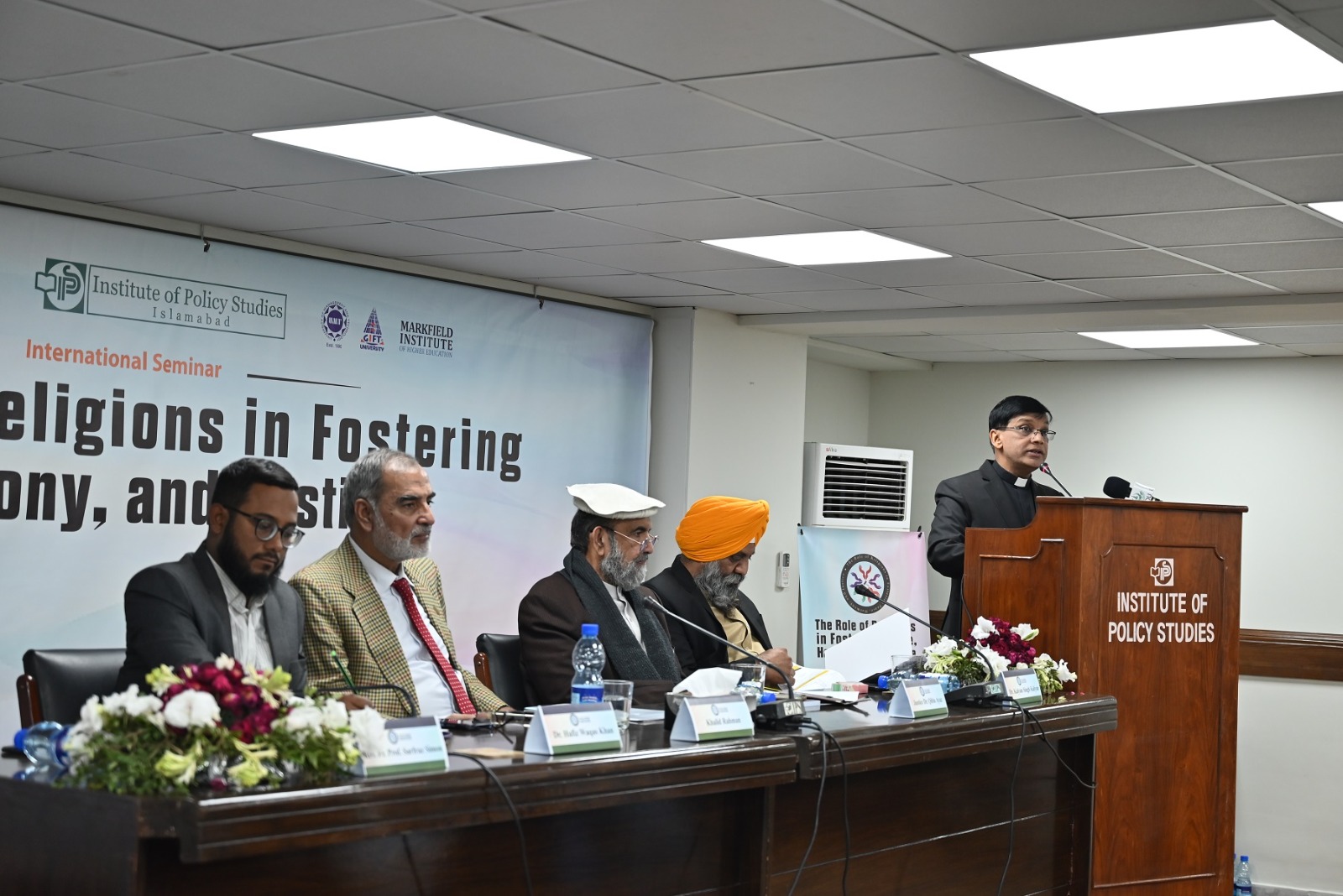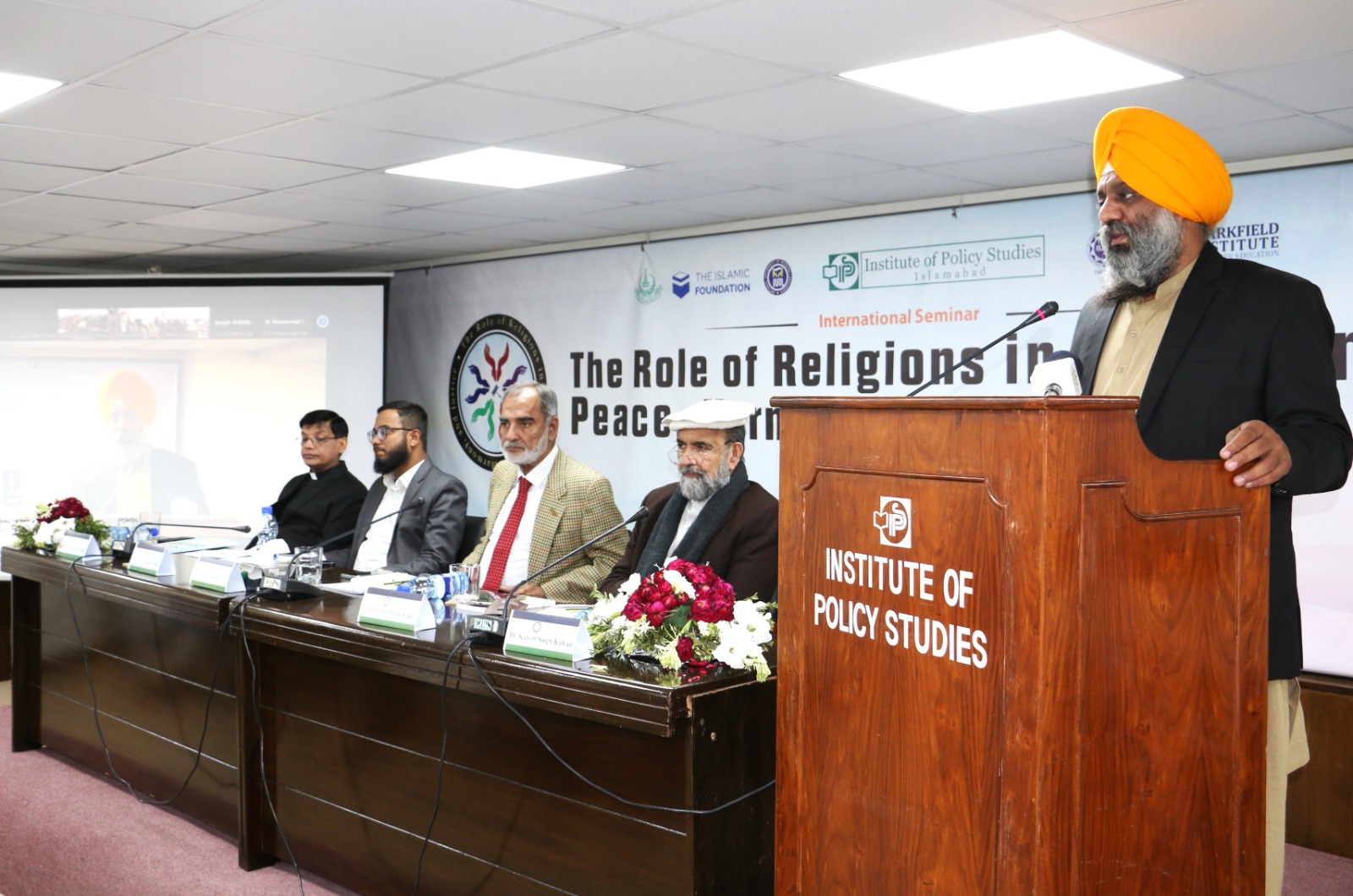Scholars & leaders of six faiths explore religion’s role in fostering global peace & harmony
ISLAMABAD, Dec 08 (SABAH): In a rare and inspiring gathering, scholars and religious leaders representing six different faiths convened at an international seminar to discuss the transformative role of religion in fostering peace, harmony, and justice.

The seminar, titled “The Role of Religions in Fostering Peace, Harmony, and Justice” and organized by the Institute of Policy Studies (IPS), Islamabad, brought together voices from Islam, Christianity, Hinduism, Sikhism, Buddhism, and Judaism to explore how shared ethical values and consciously practiced faith can bridge divides, counter misconceptions, and create a foundation for global unity. This unique event highlighted the potential of dialogue among followers of different faiths to address contemporary challenges and promote inclusive narratives rooted in mutual respect and understanding.

The session, chaired by Justice Dr. Qibla Ayaz, member, Shariat Appellate Bench, Supreme Court of Pakistan (SCP) was addressed by Rev Fr Prof Sarfraz Simon, diocesan director of Catholic Church, Dr. Neelima Shukla-Bhatt of Wellesley College, USA, Dr. Kalyan Singh Kalyan of GC University, Lahore, Dr. Samantha Ilangakoon of University of Peradeniya, Sri Lanka, Dr. Ophira Gamliel of University of Glasgow, and Dr. Hafiz Waqas Khan of Riphah International University, Islamabad.
This was followed by a panel discussion chaired by Dr. Khalid Masud, member judge, Shariat Appellate Bench, SCP, and Dr. Zahid Parvez, rector, Markfield Institute of Higher Education, UK, featuring Dr. Mary Hunter, post-doctoral researcher, St Leonard’s associate of the University of St Andrews, Scotland, Dr. Taimia Sabiha, assistant professor, International Islamic University, Islamabad, Dr. Seema Farzad, social activist, and Manzoor Masih, member National Commission for Human Rights.
The speakers observed that the adaptability of religious teachings in diverse contexts demonstrates their potential to bridge gaps, transforming dialogue into tangible change and offering hope for a future rooted in shared ethical values.
Inclusiveness is inherent in all religions, said Dr. Qibla Ayaz. However, the media’s attention to adverse incidents while overlooking positive contributions fuels religious nationalism. He suggested that religious advocates, policy influencers, and followers of religion must take collective responsibility to bridge gaps, promote unity, and use social media to amplify messages of inclusivity.
Highlighting Islam’s message of peace, justice, forgiveness, and respect for diversity, Dr. Hafiz Waqas noted that the term “Islam” itself signifies peace. He emphasized Islam’s commitment to equality and the message of reconciliation and moral leadership in fostering harmony and justice, as outlined in the Qur’an and Sunnah.
Reflecting on Christianity’s ethos of peace, Prof Simon underscored that true peace stems from “trust in God and harmonious relationships.” He stressed that freely chosen and consciously practiced faith is crucial in preventing religious violence and fostering a culture of peace.
Dr. Neelima underscored Hinduism’s inherent pluralism, rooted in the Rig Vedic principle of “welcoming noble ideas from all directions.” She highlighted ‘religious tolerance’ and ‘acceptance of diversity’ as key Vedic principles to global harmony.
Quoting Sikh teachings on self-reflection and generosity, Dr. Kalyan stressed the need to overcome misunderstandings and misconceptions about other religious teachings.
Dr. Ilangakoon shared the Buddhist ethical framework, which focuses on refraining from evil, doing good, and purifying the mind while emphasizing the belief in the egalitarian nature and potential for liberation in all humans.
Highlighting the Jewish principle from Deuteronomy to “pursue justice,” Dr. Gamliel highlighted shared heritage and interconnections between religious traditions over millennia.
The panel speakers connected these perspectives to contemporary global challenges, urging interfaith dialogue and solidarity to strengthen common values in the pursuit of peace. They emphasized the need for collective action, using shared ethical teachings as a unifying force for change.
In his remarks, Dr. Khalid Masud emphasized that religious dialogue should evolve into a global movement for human rights, transcending specific beliefs. He highlighted the adaptability of religious principles in fostering cross-cultural harmony and stressed the need to address global issues, like the Israel-Palestine conflict, with humanity as the core principle.
In his concluding remarks, Dr. Zahid Parvez highlighted the transformative power of religion and community-led initiatives in fostering unity and addressing global challenges. He called for decolonizing education and using interfaith dialogue to influence policy for justice and social cohesion.












